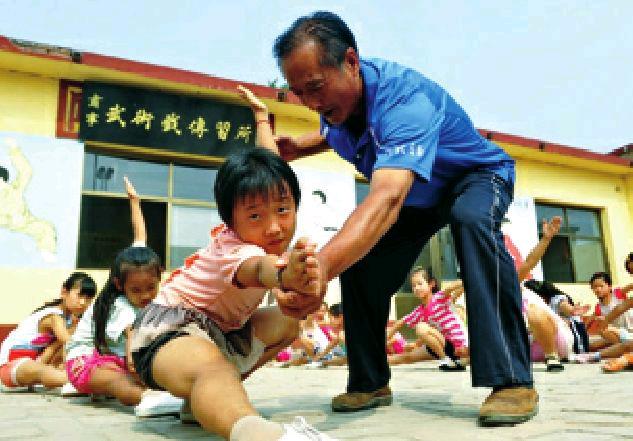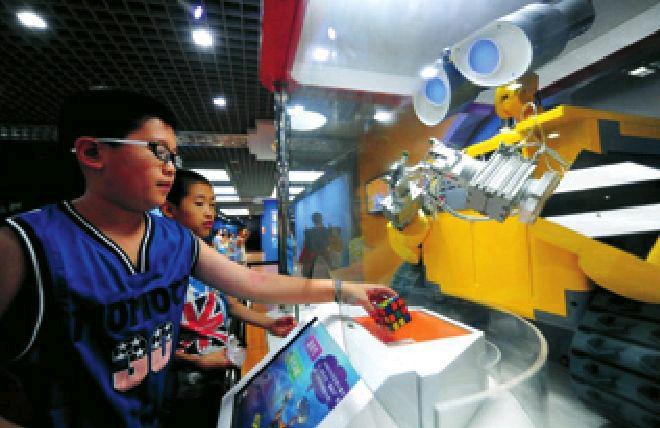The Summer Semester
2014-08-27ByJiJing
By+Ji+Jing
This summer, Wang Tianshu, a 13-year-old junior middle school girl from Qingdao, east Chinas Shandong Province, signed up for a course at Beijings New Oriental Education & Technology Group, a renowned Chinese training institute focused largely on English instruction.
“I chose to attend the course entirely on my own will because I want to improve my English speaking and listening proficiencies,” Wang told Beijing Review.
Every year, primary and middle school students like Wang travel to Beijing from across the country to take classes at New Oriental. A seven-day course, including meals and accommodation, can cost anywhere from 3,000 to 4,000 yuan ($485-645). Over 14,000 students swarmed to the companys Wudaokou campus on July 12 for registration, according to the China Business Press Release Newswire.
Summer vacation in China lasts two months, from early July to the end of August, and children spend their time off undertaking numerous pursuits. But because Chinese parents attach such great value to education, they want their kids to enjoy the holiday while still learning something useful in the long run.
Higher expectations
Beijing resident Pan Tong, whose 15-year-old daughter has attended two summer camps in the United States, said that while Chinese education focuses on improving studentsacademic performance, their other abilities often do not receive adequate attention. This includes teamwork and social responsibilities—skills that should be cultivated during the time away from school.
Pans view is echoed by many middleincome parents who have turned away from training courses or summer camps at home to so-called “study abroad tours,” which are high priced but becoming increasingly affordable for most middle-class families.
Such programs are often offered through travel agencies or training schools. According to one Beijing travel agency, half of the applicants choose the United States as their destination, while 30-40 percent head for Britain, Canada and Australia. A two- to three-week trip may cost anywhere between 30,000 and 50,000 yuan ($4,850-8,075). The tour usually includes activities such as English-language courses, interacting with local students, and visiting pres- tigious foreign universities and famous tourist destinations.
Zhang Xiaochen, a fourth-year student at the Renmin University of China Affiliated Primary School, has attended several summer camps in the United States over the past few summer vacations. At one residential camp, Zhang was impressed by outdoor activities like swimming in cold water at 6 a.m. and riding a mountain bike on bumpy roads in stormy weather.endprint
Initially, those who went on such summer tours were high school students from affluent families in first-tier cities like Beijing and Shanghai. However, in recent years, more and more junior middle school and even primary school students from second- or third-tier cities have been traveling abroad as well. Parents want their children to experience foreign cultures and prepare for future overseas studies by attending such programs.
Though many tours have fallen short of expectations—activities promised by travel agencies often dont pan out like in the advertisements—such summer vacation tours have become a trendy option for many Chinese children.
Even in less developed rural areas, despite meager household incomes, parents are sending their kids to training schools to help them become more well-rounded.
Zheng Shuangyun, an 8-year-old girl living in a village near Laiwu, in Shandong Province, is attending a one-month Latin dance course and a 15-day drawing class offered by two training schools this summer.
Though the courses are barely affordable for her family, with two kids and a monthly income of just 3,000 yuan ($485), Zhengs mother said its worthwhile because mastering a talent may allow her daughter to earn bonus points during the national college entrance exam. These skills could even enable her to attend an art college. Whats more, Zheng loves Latin dance and has practiced it for several years.
“Its a shame to have to give it up,” her mother said.
Fostering talents
However, for Li Zhengyu, a 9-year-old student at Beijings Huangchenggen Primary School, attending training courses over the summer is not his will but his mothers choice.
Lis mother takes him to five classes during the weekend—football, Chinese, math, English and public speech, all of which are offered by different training schools.
“Im only interested in the football course. However, I have to take all the others because my mother wants me to,” said Li.
In China, for children of Lis age whose parents both work, figuring out how and where to spend the summer holiday can be a headache. Parents worry about their childrens safety when staying home alone, and normally ask grandparents to look after the kids or sign them up for various training programs.
Parents have traditionally enlisted their children in Chinese, English and math courses to help them achieve better academic performance at school. However, for many Chinese parents with increasingly high expectations for their kids, outstanding grades are no longer enough; drawing classes, piano lessons, or dance are becoming necessary pursuits. As a consequence, many kids summer vacations are not so different from a school semester.endprint
Chinese parents are afraid that their children will fall behind if they dont take as many summer classes as their peers, said Fan Hesheng, a professor of sociology at Anhui University.
Fan said parents shouldnt expect their kids to be good at everything. Instead, they should choose to enroll their kids in the courses in which they show interest.
Wang, the junior middle school girl who voluntarily attended New Oriental summer courses, said she learned a lot during the nine days training.
“We had both Chinese and foreign teachers who were very enthusiastic about teaching. Now Im able to communicate with foreigners in English,” Wang said.
Additionally, Wang made friends with classmates from other provinces. “It was an exciting experience for me.”
Xiong Bingqi, Deputy Director of the Beijingbased 21st Century Education Research Institute, said children should be allowed to plan their own summer vacations. Courses forced onto kids may fail to achieve the expected result. Instead, parents should respect their childrens interests and give them some freedom, providing guidance only when their children cant work out a proper plan themselves.
At the beginning of his vacation, Li had wanted to join a summer camp that involved activities like riding camels and horses, but was not allowed to attend due to his young age.
When asked what he would do if he were to plan his own summer vacation, the 9-year-old independent-minded boy told Beijing Review: “I just want to play video games and travel abroad without the company of my parents. I want more freedom.”endprint
